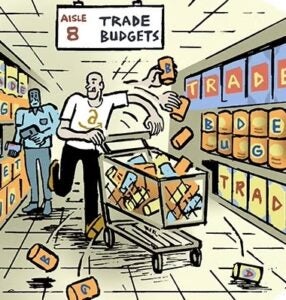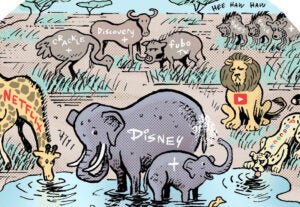 Here’s today’s AdExchanger.com news round-up… Want it by email? Sign-up here.
Here’s today’s AdExchanger.com news round-up… Want it by email? Sign-up here.
More NYT Paywall Reaction
All Things D’s Peter Kafka interviews The New York Times’ SVP Martin Nisenholtz about his company’s long-awaited paywall strategy. One tidbit – Nisenholtz on why the Ipad subscription costs more: “We built the pricing architecture off of the research as well. We basically found a greater willingness to pay among iPad users. We see iPad app users spending much much more time with our brand than either Web users or smartphone users. So the more you use it, the more you value it.” Read the entire interview. There’s more paywall coverage from AdWeek and from PaidContent’s David Kaplan who finds those that think the NYT’s ad revenue will go up with the paywall. Read it. Finally, Ad Age discovers a free NYT subscription offer from Lincoln -as in the car.
Engaging Like Hell
Solve Media CEO Ari Jacoby argues for better brand engagement metrics in an opinion piece on Adotas. He admits its self-serving considering his company’s business but remains adamant, “Brands don’t want a few crummy clicks—they want market share—and consumers can’t buy products and services they can’t remember!” He’s mad as hell and can’t take it anymore. Read more.
Walrath Chairs Yext
Former Right Media Exchange CEO is getting busy post-Yahoo!. His latest foray in the business world is as Chairman of the Board of local advertising company, Yext. Walrath tells TechCrunch that he is impressed by Yext CEO Howard Lerman, “Howard is only one I know who is dismissive of a mid-8 figure revenue stream as not being the main product.” Read more.
OBA Self-Reg Down Under
Echoing the online advertising, self-regulation initiatives in the United States, their Australian counterparts have opened up www.youronlinechoices.com.au led by that country’s version of the DAA according to WSJ-owned The Australian’s Lara Sinclair. Aussie IAB CEO Paul Fisher says, “(Signatories to the guidelines) will not combine OBA anonymised data and personal information without complying with the Privacy Act.” Read more. Meanwhile, Sinclair writes in another article that “publishers claim they are being pressured by media agency buying groups into giving them exclusive advertising inventory to auction.” Read here.
The Agile Marketer
In a follow-up article on ClickZ regarding agile marketing, Brian Massey asks Rose Holston of Aviso Communications to explain some of the steps involved in “an agile online testing program.” Agile isn’t just for you software developer types evidently. First, Holston offers three questions that need to be addressed: ” 1. Why will we test? 2. What do we test? 3. How do we test it?” Read it.
AdExchanger Daily
Get our editors’ roundup delivered to your inbox every weekday.
Daily Roundup
Crowd Buying: The Event
LeadsCon empresario Jay Weintraub is adding another “quill” to his convention business as he targets the raucous world of crowd buying with “The Daily Deals Summit.” The speaking agenda includes Auren Hoffman of Rapleaf; Jake Maas of LivingSocial; Jonty Kelt, CEO of Group Commerce; Lou Kerner, analyst at Wedbush Securities; and Vinicius Vacanti, Co-founder of Yipit. Read more on .
GroupOn The Ad Network
How about adding an ad network, GroupOn? That’s Dan Frommer’s supposition in an article on The Business Insider. He writes, “Groupon could either offer specific deals — and dynamic, just-in-time ad creative — based on the user’s location and time of day. Or it could make an attractive “I’m Hungry” “I’m Bored” button ad. The ads could direct people to a mobile web site or to Groupon’s app, where users could complete their purchase.” Yes. Big data = big ad opportunity in every market that GroupOn resides. Read more.
Researching Trade-Offs
On iMedia Connection, KN Dimestore’s Florian Kahlert pens, “How to cut corners without cutting ad data value” and discusses some of the complexity in creating effective advertising research with real insights. Kahlert writes, “In research, as in many other areas, it is impossible to have good, fast, and cheap at the same time. Compromises have to be made, and it is the research vendor’s responsibility to educate the clients about the various trade-offs.” Read his trade-offs.
The Facebook “Likeberg”
New word – “likeberg”! I didn’t think of it. Efficient Frontier’s Justin Merickel appears to have coined the word as he breaks down the Facebook ad opportunity on EF’s blog. He writes, “I’m here to argue that because of the new form factor of social media, Facebook ads can’t and shouldn’t be characterized as upper or lower-funnel.” Read more and find out about the tip of the “like” iceberg or “likeberg.”
Foursquare Geo
Data, data, everywhere. GuideMe’s Pat McCarthy announces on his company’s blog that they’ve started to use the free, Foursquare API for geo-location information. He identifies a significant trend among data platforms in his company’s arena as they work toward “venue harmonization.” McCarthy writes, “It’ll be interesting to see if Foursquare can get Facebook, Google, Yelp, or any of the other big dogs to participate in this. While I can see why they might not for competitive reasons, for the good of consumers, startups, and developers they should in order to move everything forward.” Read it.
Do-Not-Track Consequence: Paid E-Mail
The SF Chronicle’s James Temple looks at the online privacy debate and adds his two cents: “Some companies have begun to hint that users who turn on Do Not Track tools may not get the same feature-rich services as those who do. But if so, at least then the true terms become clear to all parties in the transaction. People will be forced to consciously decide that it’s a fair trade – or that it’s time to pony up for paid e-mail.” He means free email will no longer be free. Read more.
But Wait. There’s More!
- The Effect of Social Networks and the Mobile Web on Website Traffic and the Inevitable Rise of Facebook Commerce (PDF) – Adgregate Markets white paper
- Google DoubleClick Integrates Real-Time Bidding For In-Stream Video – MediaPost
- AT&T Buying T-Mobile USA In $39 Billion Deal – The Business Insider













